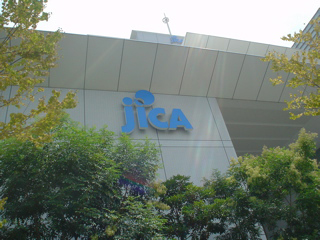'JICA' means 'Japan International Cooperation Agency'. 'JICA' is
part of the Japanese government. It was founded in 1974, but its roots
go back to 1954, when Japan joined other countries in Asia doing
'international cooperation'. 'International cooperation' means when
countries try to help each other with things like technology or social
problems.
One of JICA's main goals is to share knowledge. This means
teaching and learning. JICA has many 'training centers' in Japan. At
these centers, trainees from many countries learn technical skills that
will be useful to their country. JICA also sends volunteers from Japan
to other countries. There are JICA people in many countries around the
world working hard to make the world a better place. People who become
a JICA volunteer live in a country and learn about the country while
they
try to help it solve its problems.
All
volunteers live in the country
for at least two years, but some stay for three. Any Japanese
national over 20 can take the test to become a JICA
volunteer, but having experience in a technical field helps your
chances of being sent to a country. Someday, why don't you try!
JICA is Japan's ODA program. ODA means 'official development
assistance', so 'offical' means 'by the government'.
This is different from an NGO which means 'non-government'. Japan is
number 2 in the world for total ODA money given around the world,
but in relation to GNP it is much lower. As a percentage of GNP,
Norway, Denmark, and Luxembourg are number 1,2, and 3. Much of the ODA
money goes to countries in Africa. ODA money is partly grants and
partly loans. Even if it is a loan, the interest is very low.
Of course JICA aims to do good things and they do. However,
sometimes there are mistakes. A typical example of an ODA mistake would
be to make a dam in a place that didn't need it. Another example is
the 'green revolution'. Developed countries helped poor countries learn
better ways of farming. However, the new ways were too expensive for
the farmers to use.
JICA and ODA is one of the ways we try to make the world a
better place. Even if you don't join JICA, knowing about it is
important.

